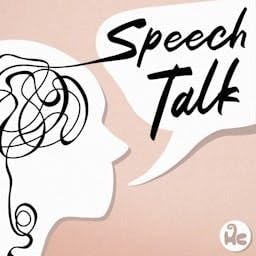Traumatic brain injury isn’t just a young‑guy‑playing‑sports problem. This week on Speech Talk, we’re diving into TBI in older adults—a population with the highest rates of hospitalization, morbidity, and mortality related to brain injury. Using the ASHA review Traumatic Brain Injury in Older Adults: Epidemiology, Etiology, Rehabilitation, and Outcomes, we break down why TBIs are so common (and so often missed) in geriatrics, especially in SNFs and hospital settings. From falls and car accidents without a concussion diagnosis, to chronic health conditions and polypharmacy, this episode connects the dots between normal aging and TBI‑related cognitive‑communication changes. We talk through what TBIs actually look like in older adults, how to tell aging apart from injury, what assessments clinicians are really using in rehab, and how functional, fall‑focused, real‑world therapy can make a difference. If you’ve ever felt underprepared when a “no concussion noted” patient suddenly isn’t making sense—this one’s for you. You’ll learn: Why older adults have the highest risk and worst outcomes related to TBI The most common causes of TBI in geriatrics—and why falls dominate the picture How TBI presentations differ from typical age‑related cognitive changes Key cognitive‑communication, executive function, and neurobehavioral red flags Chronic health factors that increase TBI risk and complicate recovery Common assessments used with older adults after TBI (SLUMS, MoCA, SCATBI) Practical, functional treatment strategies that translate to real life Why fall education and environmental awareness matter so much in SNFs Citations:Most of today’s data comes from a 2022 ASHA review synthesizing multiple large epidemiologic studies on traumatic brain injury in older adults. Mattingly, E., & Roth, C. R. (2022). Traumatic brain injury in older adults: Epidemiology, etiology, rehabilitation, and outcomes. Perspectives of the ASHA Special Interest Groups, 7(3), 648–662. https://doi.org/10.1044/2022_PERSP-21-00129 Albrecht, J. S., McCunn, M., Stein, D. M., Simoni-Wastila, L., & Smith, G. S. (2016). Sex differences in mortality following isolated traumatic brain injury among older adults. Journal of Trauma and Acute Care Surgery, 81(3), 486–492. https://doi.org/10.1097/TA.0000000000001104 Taylor, C. A., Bell, J. M., Breiding, M. J., & Xu, L. (2017). Traumatic brain injury–related emergency department visits, hospitalizations, and deaths—United States, 2007 and 2013. MMWR Surveillance Summaries, 66(9), 1–16. https://doi.org/10.15585/mmwr.ss6609a1 Fu, W. W., Fu, T. S., Jing, R., McFaull, S. R., & Cusimano, M. D. (2017). Predictors of falls and mortality among elderly adults with traumatic brain injury: A nationwide, population-based study. PLOS ONE, 12(4), e0175868. https://doi.org/10.1371/journal.pone.0175868 Bhullar, I. S., Roberts, E. E., Brown, L., & Lipe, H. (2010). The effect of age on blunt traumatic brain-injured patients. The American Surgeon, 76(9), 966–968. . The effect of age on blunt traumatic brain‑injured patients. The American Surgeon, 76(9), 966–968. Get in Touch:📧 hello@speechtalkpod.com🌐 www.SpeechTalkPod.com📸 Instagram: @speechtalkpod Part of the Human Content Podcast Network Learn more about your ad choices. Visit megaphone.fm/adchoices
続きを読む
一部表示
 2026/02/1047 分
2026/02/1047 分 30 分
30 分 40 分
40 分 2025/12/3031 分
2025/12/3031 分 2025/12/1638 分
2025/12/1638 分 2025/12/0227 分
2025/12/0227 分 2025/11/1831 分
2025/11/1831 分 2025/11/0429 分
2025/11/0429 分
